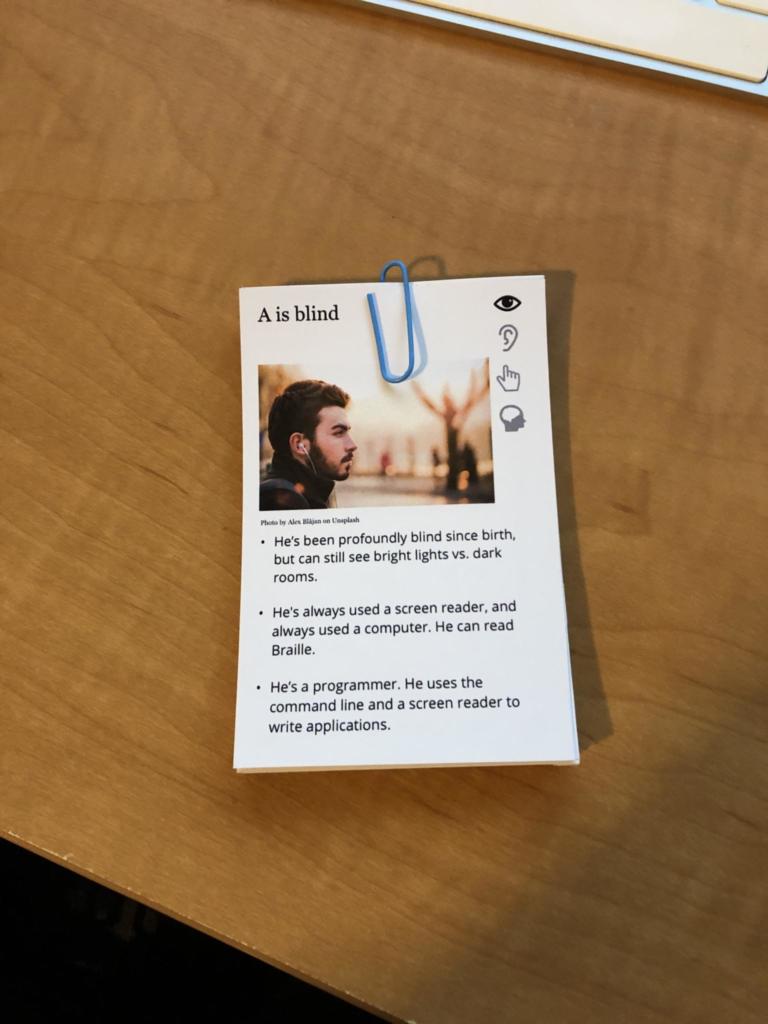About, oh, three and a half years ago now, I wrote a little post on a little site called The Pastry Box about all the people I knew who needed accessible websites. It was called An Alphabet of Accessibility Issues and it was inspired by some developers I was working with at the time who believed there were exactly three types of disability in the world:
- The profoundly blind guy who needed a screen reader and who made their work harder
- The profoundly deaf guy who needed captions and who made their work harder
- The guy “with like a broken arm” who couldn’t use a mouse but would probably be fine later and thus didn’t actually need keyboard accessibility
People with cognitive issues never even crossed their radar – they were deemed unable to work in my co-workers minds. Anyone who was permanently disabled, actually, pretty much fell into that category… or for some reason maybe they thought they just shouldn’t work?
I didn’t press it, I was too busy being furious.
I was furious because even before I hit my 40s I was noticing my hearing wasn’t so fantastic anymore for that poorly-recorded video on the intranet that wasn’t captioned… and I screwed up my shoulder and didn’t like using the mouse (and the keyboard was faster anyway)… and how about that day I was in the office when my glasses broke and I couldn’t work but I also couldn’t drive home?
And what about this family member with this condition and that friend with that condition and all my friends and family with cancer and just the stupid simple stuff like language barriers and the harder-to-detect stuff like low vision?
Apparently I struck a nerve in my post, because not only did people agree that yes, these were also valid scenarios that need accessible websites, but the post went viral and people wanted a poster version and more information…. and I became convinced this accessibility thing was a pretty good fit for me.
Last year, my friend and fellow editor Dylan Wilbanks persuaded me to turn the article into a talk.
After the IA Summit, a few other people asked me to turn the talk into a deck of cards. And then a few others did later. And then a few offered to either make cards themselves (and wanted to know if they could use the talk) or reiterated they would love cards…
A few months ago, the organizers of World IA Day Pittsburgh asked me if I would cross the state and present to them for today, World IA Day 2019: Design for Difference. And I thought, anne, get off your butt and make the cards.
So if you attended today’s workshop, you got a copy of my prototype deck, which contains the 26 people who were mentioned in the original article.
And I have already learned a few things:
First, since the original article went up I’ve found at least another 26 situations or conditions affecting my actual friends and family that are worth mentioning. Everything from cataracts to migraines to back pain to having the kitchen torn out cause people to need captions or simpler language or zoom or color controls. So I’m now in the position of trying to figure out what the second half of the deck is going to be, because I don’t think I can extend the talk to 52 slides, but I can certainly extend the deck to 52 cards.
Second, the cards need a good legend and bigger text and a couple of other things I’m in the works on. (Along with those other 26 profiles and pictures and words and stuff.)
I’ll be, eventually, publishing the cards for sale on The Game Crafter, because the third thing I learned is that I don’t like being up until 2 in the morning slicing cards on my turns-out-n0t-to-be-very-great printer. That coupled with my existing knowledge that I hate the local post office means I’d much rather you buy from a pro who can print on demand than I try to run a publishing outfit out of my living room.
And finally, I’ve now got a workshop centered around the Alphabet of Accessibility. It’s probably at least two hours — I say that because I had one and a quarter hours to present in this one and I got through three things on my six thing agenda. So that’s kind of cool.
I’m starting to think about a talk for next year, but not about accessibility… more about design systems, since that’s where my head is at work right now. But I highly doubt that accessibility won’t come up in some way, shape, or form, because, well, people. We’re weird and we’re messy and there’s no one-size-fits all, there’s not even a “normal”, and as long as people insist on trying to oversimplify the human condition and inflict that oversimplification on others, I suspect I’ll be somewhere in the background finding new ways to reword “What the hell is wrong with you?!?”
Meanwhile, if you’d like a deck, watch this space, or follow me on twitter (yes I know I’m sorry) and I’ll announce more when I’m further along in production. Maybe even in time for Global Accessibility Awareness day.
[Update: The deck is now available.]

